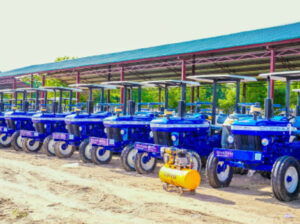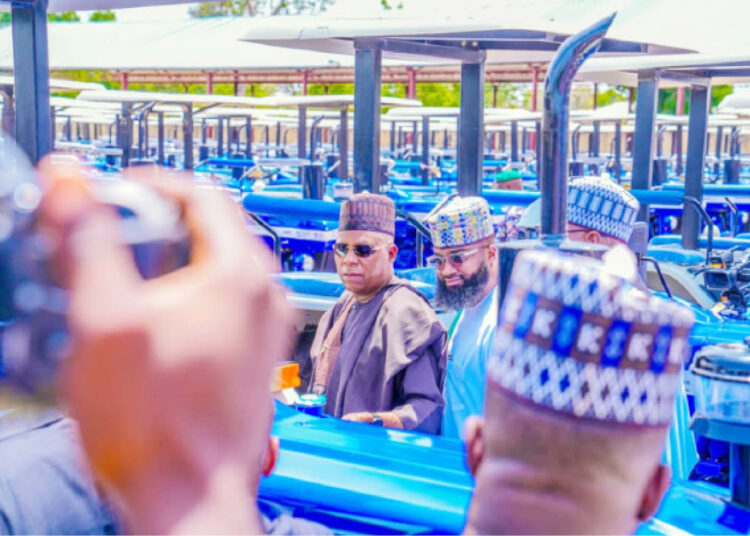Nigeria’s quest to fight hunger and food crisis took an optimistic dimension recently when the National Agency for Science and Engineering Infrastructure (NASENI) launched the National Asset Restoration Programme in Maiduguri, Borno State with special focus on Tractor Recovery Project.
The Programme unveiled in Maiduguri is one of the legions of initiatives and timely intervention to the revive livelihoods, food security, and self-sufficiency. NASENI’s Tractor Recovery Project, a subset of the National Asset Restoration Programme is a well-thought and strategic roadmap, aimed at accelerating Nigeria’s agricultural productivity and to grow its industry.
It aims to increase investments in this critical sector to boost the country’s gross domestic product (GDP), increase revenue, and create jobs through targeted interventions and reforms. NASENi’s contributions to the nation’s agriculture mechanization policy is an incentive to build strong centres to address infrastructural challenges and promote key sectors like agro-allied industries.
Through the National Asset Restoration Programme (Asset Restore Project) NASENI recently unveiled 375 tractors belonging to the Borno State Government that were fully funded and refurbished by the Agency. The tractors were commissioned by Vice President Kashim Shettima GCON, on Sunday, June 8, 2025 at the Borno State Agricultural Mechanization Agency, Farm Centre in Maiduguri, Borno State.
This NASENI project emphasized building strong centers of creativity and skilled development. This initiative has been the brainchild of the Executive Vice Chairman/CEO of the Agency, Khalil Suleiman Halilu, who has made enormous efforts to transform the Nigeria’s agriculture landscape through industrial and mechanized capacity.
Halilu’s bold vision in rebuilding and repositioning NASENI resonates with the ‘Renewed Hope Agenda’ of President Bola Ahmed Tinubu focusing on three (3), five (5) and seven (7) Presidential Priority Areas: ‘Boost Agriculture to Achieve Food Security’, ‘Enhance Infrastructure and Transportation as Enablers of Growth’, and ‘Accelerate Diversification through Industrialization, Digitization, Creative Arts, Manufacturing & Innovation’.

The Agency is strengthening its commitment to enhancing Nigeria’s agricultural productivity through innovative infrastructure under the programme. Food sufficiency and self-reliance are at the heart of Halilu’s quest to change Nigeria for the better. This development is all-inclusive and through it NASENI has encouraged the patronage of locally produced goods to stimulate domestic demand and support local industries including addressing key challenges and build capacity in identified sectors.
In essence, the NASENI Tractor Recovery Project is a comprehensive plan to drive Nigeria’s agro-industry, create jobs, diversify the economy, and enhance its global competitiveness through mechanized farming. NASENI embarked on this historic journey in December 2024 through a strategic collaboration with its technical partner, the Machine and Equipment Corporation Africa (MECA).
For the EVC/CEO of NASENI, the goal is to restore back to life idle government and private assets; in this case, tractors that had long fallen into disuse but held immense value for our agricultural economy. A national survey carried by the Agency revealed that Nigeria holds over 47,000 broken-down but serviceable agricultural and law enforcement assets. The cost to replace them would exceed ₦14 trillion.
“With the right engineering, the right people, and the right partnerships, we found that we can recover these assets for just 15 per cent to 25 per cent of their replacement value—and still achieve full functionality. That is over ₦10 trillion in national savings, while reviving productivity, jobs, and security on the ground. That is the power of engineering. That is the promise of NASENI.
“The assets we restore must be maintained. The systems we build must be scaled. And the culture we’re creating—of making things work and keeping them working—must spread far beyond NASENI. I say to our Ministries, MDAs, states, and security agencies: let us break the cycle of waste. Let us treat every machine, every tool, every part—not as a sunk cost, but as a strategic national asset,” said Halilu.
According to the Project Coordinator, National Asset Restoration Porgramme, NASENI, Engr. Mohammed Yadudu, from an initial inventory of 602 tractors, the Agency after careful assessment, identified 375 priority and serviceable units. Each of these machines, today, has undergone a full end-to-end refurbishment through an eleven Step Reverse Engineering Process which is grounded in intelligence, technical rigour and local ingenuity.
“This method began with the reconstruction of maintenance histories, continued through diagnostics, prioritization, dismantling, and technical assessments, and concluded with targeted repairs, component upgrades, reassembly, and performance testing. In effect, these are not just restored tractors—they are revitalized assets, upgraded to perform under modern conditions,” he said.
According to Engr. Yadudu this initiative goes beyond asset recovery; it is a strategy for national economic renewal, aligned with the President’s Renewed Hope Agenda. According to data from Food and Agricultural Organization (FAO), an agency of the United Nations, Nigeria’s agricultural sector relies heavily on manual labour at 89 per cent, with animal power at 10 per cent and mechanization at just one per cent.
Engr. Yadudu said the introduction of 375 refurbished tractors will significantly increase mechanization levels and tractor density in Borno State. “This project is projected to cultivate over 500,000 hectares annually, directly benefiting more than five million farmers. Beyond boosting productivity, it positions Borno as a model for agricultural resilience and climate-smart food systems.
“In Nigeria, agriculture remains the largest employer of labor. And yet, mechanization—a critical enabler of agricultural productivity—has remained largely out of reach for many smallholder farmers. These 375 refurbished tractors are projected to create over 20,000 direct and indirect jobs across the state and the region at large.
“These are jobs in tractor operations, field services, mechanical repairs, parts supply, logistics, and most importantly, in the farming activities these tractors will now support. That’s 20,000 opportunities for youth empowerment, for income generation, and for a reduction in the root causes of insecurity that often stem from unemployment and disempowerment,” Yadudu said.
This initiative demonstrates how NASENI can connect security with economic development, by investing in productive assets that put people back to work and food back on the table.
This NASENI intervention will also save the federal, state and local governments billions of naira in capital flight. At today’s exchange rate, importing new tractors of this quantity and grade would have been economically burdensome. But through local innovation, Nigerian engineering talent, and strategic refurbishment, we’ve delivered high-quality results at a fraction of the cost, without compromising performance.
There is the need for more support for the National Asset Restoration Programme as it will go a long way not only to revive idle government investments, but to rebuild livelihoods and boost national development in a sustainable and inclusive way.
With this development NASENI has reaffirmed its vision “that no broken asset in Nigeria should go to waste, and that no community should be left behind in our national drive for economic transformation and food security.”
As the Agency intensifies its efforts in revitalizing abandoned government assets, it is a clarion call on the government MDAs to show prudence in their fiscal responsibilities, come forward and reach out to NASENI to revive their idle abandoned assets and save the economy billions of naira that would have been wasted in procurement processes.
The epoch making event organised by NASENI in Maiduguri is an opportunity for other state governments to revive their agriculture ambitions through mechanization for effective and efficient agricultural production. Making food security a reality can only be realized through mechanization and NASENI is here to making it happen.





